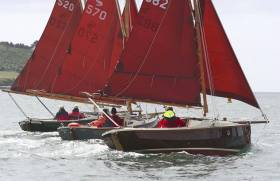Displaying items by tag: Cornish Shrimper 19
Cornish Shrimpers – Old Gaffer Style With Compact Modern Convenience
With the current prospect of foil-borne IMOCA 60s disappearing towards the horizon at phenomenal speeds in the Vendee Globe Race to remind us of how modern life is just all rush and bustle, we could be forgiven for thinking in terms of getting relaxation afloat with a style of sailing which is about as different as possible writes W M Nixon.
Thus you’d get to thinking in terms of traditional rig and old-fashioned looks in terms of hull shape. But then, it being that time of the year when maintenance planning and its inevitable expenditure is coming top of the agenda, you get to thinking that old-fashioned and winter expense are so often synonymous. So all hail the plastic gaffer. Or more accurately, the new plastic old gaffer.
Both the current and previous International Presidents of the Old Gaffers Association sail the seas in plastic gaffers, and they do such a good job of it that nobody thinks any the less of them for having boats which by-pass the maintenance expense of traditional timber craft. And Denis Aylmer, the top honcho in the Dublin Bay Old Gaffers Association, likewise is plasticized while still gaffing, though it should be remembered that in his much younger days he more than did his duty in preserving Galway hookers which others had thought were beyond saving.
As you get further down this line of sensible traditional-through-plastics line of thought, the logic suggests as small a boat as possible which can properly qualify as an Old Gaffer, yet still be a boat which can be reasonably conveniently road-trailed to your summer’s sailing area.
It might be stretching it a bit to describe the Cornish Shrimper 19 as a trailer-sailer. But as Afloat Boats for Sale currently carries ads for two of these attractive character boats with one in Whitehead in County Antrim and the other in Kilmore Quay in County Wexford, the fact that most Irish sailors would have to think of a journey to get them home adds to their appeal as a very manageable road trail.
As to how you use them, most folk see them as day sailers, but in the Classic version there are two bunks, and the 2 + 2 variant can actually sleep four. That’s thanks to the ingenious incorporation of a V-berth right forward, but frankly you’d need to be very good friends to think of utilising that option.
Cornish Crabbers have been building the Cornish Shrimper 19 since 1979, and more than a thousand now sail the sea. They inspire their own special camaraderie for class rallies and other gatherings. But equally they can give a good showing of themselves in open gaffer events. The one in Whitehead is priced at €12,000, while the one in Kilmore Quay is €15,900 – either way, they’re the perfect antidote if you’re suffering from IMOCA 60 fatigue.






























































